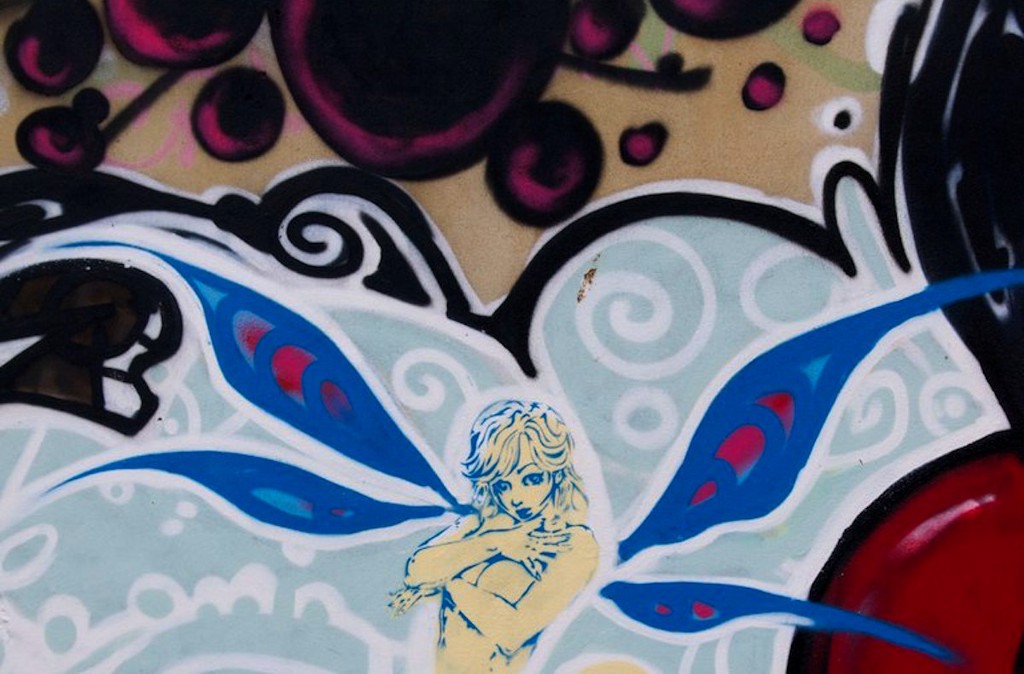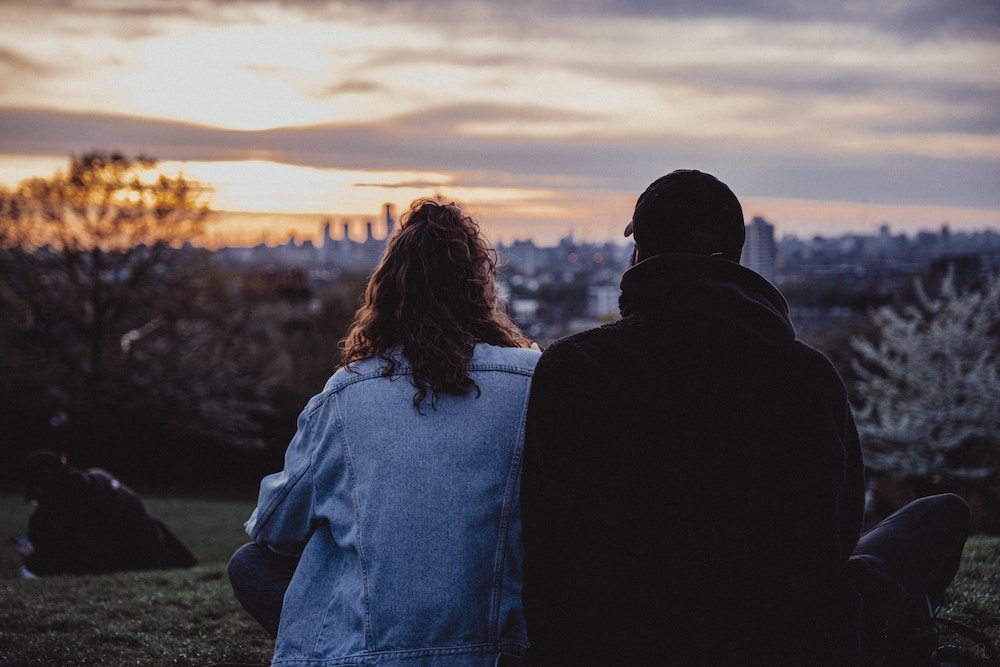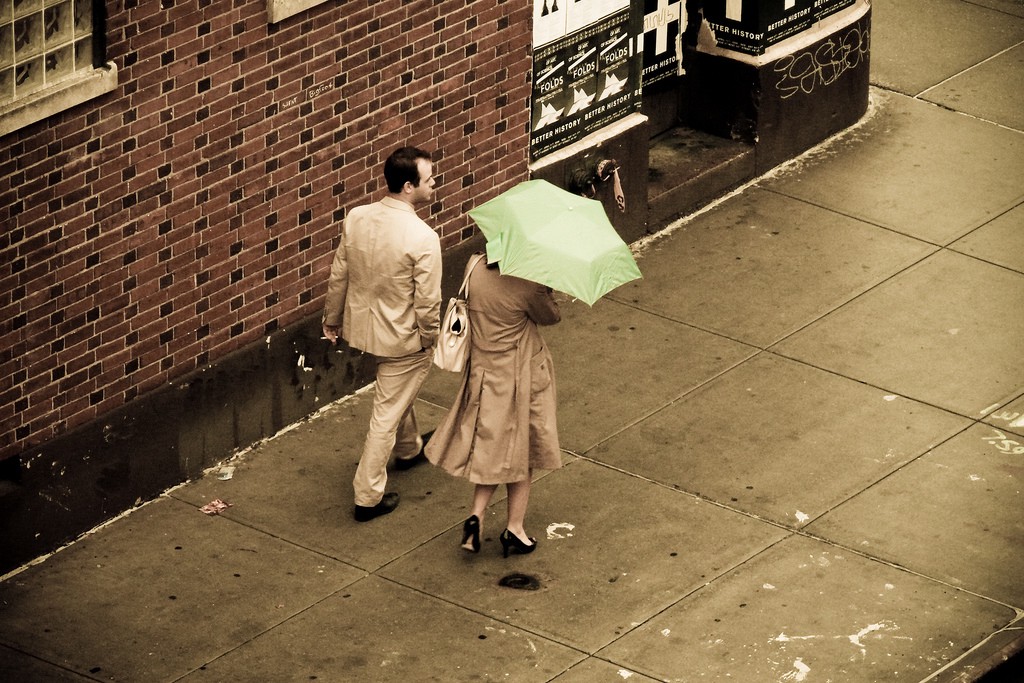Novel Gazing
Falling in Love with Francesca Lia Block
Her magical Los Angeles made me hungry for love—but more than that, it made me hungry for language

Novel Gazing is Electric Literature’s personal essay series about the way reading shapes our lives. This time, we asked: What’s a book that made you fall in love?
Like all the best love stories — at least all the love stories I spun for myself during the long waiting years — it began with a dose of kismet. A chance encounter in a bookstore, when I wasn’t looking for anything special; I just wanted something light to accompany my assigned summer reading on a family vacation. I’d never heard of Francesca Lia Block. I thought the title was funny: I Was A Teenage Fairy, a winking nod to cliche filled in with an implication of magic. The front cover showed a surly blue girl with wings, and the back cover called it “a potent brew of magic and transformation.” I didn’t think I was craving transformation, but I must have been a little ready for it — because when I, an unusually fastidious child when it came to monitoring the appropriateness of my own reading material, came across the word sex on the second page, I didn’t close the book flushed with shame. Instead, I read on.
Knowing the kind of reader I was, it’s strange to me that I thought two books would be enough for a week on the road. But I couldn’t have picked better: to say I was enraptured would be to understate how fully, how eagerly I fell into the spell. I Was A Teenage Fairy is the story of Barbie Marks, a young California model, and Mab, a tiny, green-skinned fairy (although she hates that word), who may or may not exist (although she would sniff most haughtily at you for doubting her). Like most of Block’s books, the story tilts on the axis of a central trauma; revisiting it as an adult, my stomach lurched immediately the first time Barbie’s mother leaves her eleven-year-old daughter alone with a famous photographer, who beguiles and manipulates her before committing a violation that sends her running from his studio. Like all of Block’s books, it’s set in a version of Los Angeles that teems with a magic far beyond the flapping of fairy wings.
Indeed, Mab was for me the least exotic of the book’s offerings. I was more fascinated by Hollywood parties in abandoned hotels with fountains of wine, matinee idols and aging punks, bass-thumping clubs and vegan restaurants, liquor and drugs, glitter and vinyl and neon and lace, beautiful boys with unwise tattoos on beautiful bodies they used in ways I had only ever abstractly considered I might someday use mine. While the first part of the book centers Barbie as a child in the months leading up to her assault, the second part focuses largely on Barbie at sixteen, trying to regain some sense of sexual agency with a gregarious actor named Todd. I was fascinated by Block’s description of the two of them “flying horizontally in front of the fireplace, their mouths tearing carnivorously, practically cannibalistically, at each other,” so hard Barbie thinks her lips might bruise; I was wildly intrigued by the idea of someone’s body inside mine as “startling and tender at once, completely different and an exact extension of who she was.” Reading and rereading the novel in an RV in the perpetual daylight of an Alaskan summer alongside 1984 — my summer reading, a book which at this juncture in my life also impressed me primarily for its discussion of sex — I dreamed one night of a dark-eyed boy on a beach, our limbs painted golden under the setting sun, bodies moving together in an unspecified, pulsing way. When I awoke I thought: I’m different now. I carried it with the thrill of a secret, like a promise: that before I had lived one life, and now I was stepping into the very beginning of something new.
That would come later, or enough of it that I didn’t feel cheated: the boys and the bodies and the booze, and some of the softer drugs, cocktails in restaurants that didn’t card, hair dye and an eyebrow ring and, just once, a mosh pit, which I spent mostly wishing I’d worn my contacts. Later I would know what it was to feel desire like a need, and to walk with someone through a city that felt like a set for the story of your blooming love. But before, when I still wore an ugly school uniform and knew no boys I could imagine ever wanting to touch, I had Francesca Lia Block. I went home and devoured every one of her books.
Do you believe that every time you fall in love is in some way an echo of your first? I felt this fervently, with a kind of self-indulgent despondence, in the shadow of my first heartbreak, certain I would spend a lifetime failing to recapture the intensity of feeling in which I had spent eighteen months submerged and gasping for air. I felt it with a kind of relief, falling in love as an adult, seeing that overwhelming force as stemming from the shakiness of adolescent personhood as much as from the strength of my heart. Now, seven years into partnership with the same person, I hardly think of this idea at all, and if there’s any truth in it it’s only this: that love, like anything truly powerful, changes us, and so the self that loves now is not the self who would have loved had not that first love passed through her like a fever, like a wave.
When I think now of what Block meant to me then, what comes to mind first is not in fact the scores of salacious details which once so enthralled me. Instead I think of the opening of I Was A Teenage Fairy, which begins:
If Los Angeles is a woman reclining billboard model with collagen-puffed lips and silicone-inflated breasts, a woman in a magenta convertible with heart-shaped sunglasses and cotton candy hair; if Los Angeles is this woman, then the San Fernando Valley is her teenybopper sister.
I had never read anything like this — the extreme personification, the clutter of hyphenates and adjectives, the daisy-chained clauses that don’t resolve the way you expect them to, the warped syntax of a woman reclining billboard model. I remember puzzling over that phrase, wondering if I’d read it wrong, if there was a missing word; then coming to love its strangeness, picking the book off my shelf just to reread this passage. Block devotees, current or reformed, always point to this, and it was above all what drew me into obsession: the incandescent beauty of her prose, its color and texture and fairy-tale rhythms, sparkling with phrases like “glamorized by light” and “quiversome twinkle.” Her writing struck me, to borrow a line describing Mab’s wings, as “gorgeous, ephemeral, shiveringly exquisite.” I even loved the words that always appeared on her back covers to describe it: lyrical, calling up associations to myth and music; lush, crowded with life. As an adult I can see what my mother, ever the literary snob, meant when she wrinkled her nose after I read her a passage: “It’s a little precious, isn’t it?” But at the time, I could only think: yes, shouldn’t it be? Precious like rubies or gold, shining and ornate; precious like a secret, illuminating my life, like a love.
And like any love, it changed me. I wrote poems and vignettes overflowing with ineptly executed traumas and imagery about mermaid’s songs and crystalline tears and the dripping flesh of fruit; I typed up exercises in free association, trying to make my words as strange as possible, trying to achieve the degree of radical originality I perceived in Block. I reread pages not to revisit what had happened but to burn the cadence of favorite paragraphs into my throat. As a kid I had loved stories, loved characters; now I loved language. Words were no longer merely a tool for communication but a source of pleasure, the source of pleasure, in and of themselves; language took on an aesthetic dimension, became almost a sensual experience, the right sentence leaving me awed with a nearly physical ache.
As an adult I can see what my mother meant when she said ‘It’s a little precious, isn’t it?’ But at the time, I could only think: yes, shouldn’t it be?
Of course I moved on, to other writers, other loves. But just as my high school sweetheart left me with a lingering soft spot for shaggy hair and a worn leather jacket, I see Block’s legacy in the traces of other writing I have loved: the hallucinatory ecstasy of Clarice Lispector, the dazzling precision of Zadie Smith, the bloody pulse of Megan Abbott, even the unwieldy gorgeousness of F. Scott Fitzgerald’s Tender is the Night. When I pick up a book, what I still hope for more than anything is to be knocked breathless the way I once was by Block’s woman reclining billboard model; and when I write, I ask myself, is this honest, yes, but always is this beautiful, too.
Technically the affair began June of my thirteenth year, but when I reach into the untrustworthy sea of memory the book floats tangled with private occurrences from summers before and after, a whole stretch of life collapsed into a single impossible July: sun peeling our shoulders and water cool along our shins, the air in the mornings cold at the summer camp by the lake, holing up in our bedrooms and each other’s bedrooms, seeking refuge from the heat and the lonesomeness of domestic life. Admiring my tan lines in the shower, not for their aesthetics but as visible proof of the passage of time, temporary souvenirs of my excursions. Summer was the only time I listened to the radio, and so there’s a selection of songs that seems to me to have come into being somewhere between our bunk and the mess hall: “A Thousand Miles,” “Say My Name,” that “Heaven” remix, “Drops of Jupiter,” which I liked because I thought the lyrics — she acts like summer and walks like rain — sounded like something out of a Francesca Lia Block novel, which strikes me now as simultaneously a good joke about Train and a mean joke about Block.
In fact that’s inaccurate: I didn’t enjoy listening to it — I hated the vocal, a creaking thing I, raised on musical theater and Enya, had no framework to appreciate — but I liked the lyrics so much, and treasured so deeply the association I’d formed between them and my current literary obsession, that I forced myself to find a way to like the song until in fact I did. I bought the album and would listen to it thinking of a line from Block’s The Hanged Man, where she describes a man with a voice that “cracks like ice when you pour the liquor over.” I love to laugh about this now: the early signposts on our road to something like desire. Here’s another one: listening to a line from that Sting song, “Fields of Gold,” feel her body rise / when you kiss her mouth, and thinking, I want someone to do that, deliberately, like I was practicing for the real wanting, even as the line mostly filled me with wonder — why would a kiss act on a body like that? How much would you have to feel for your body to act on its own accord?
I think of this time with a tenderness darkened only by the awareness of how lucky I was to have it: the long unfurling edge of childhood, a body coming to know itself new and slowly readying for what was to come. And it wasn’t only the body, or it was but only in that the heart is part of the body, as is the mind. I remember also reading A Tree Grows in Brooklyn, the first book to ever make me cry, and loving the way it gutted me: the sudden access of a new depth of feeling, my heart split painfully and beautifully open. I thought Train was sexy, or what I imagined that word to mean, but I also came to cherish them as the first unpretty music I ever liked, a door that led later to nights lying in bed, listening to Dylan. I read some Louise Glück poems for class and purchased her complete extant works, poring over them like holy texts, in awe of how much could be communicated in a few short lines. Which is to say that puberty was a bodily awakening, but it was an intellectual one, too; and threaded through all of this, entwined with Baz Luhrmann movies and Tori Amos records, was the dark beauty of Block’s sentences, the match on kerosene that showed me a path to what I loved, and left me eager for more.
It’s funny: these were such unhappy years. My family was fracturing across a series of crises that left me intimate with fear and loss and guilt; in response, I was winding myself ever more tightly into patterns of thought that would eventually metastasize along with all the things I buried into a long and deep illness. It startles me to realize that this story was happening alongside the other one, that during a time of bitter dissolution I could still find richer ways to love beauty, could still begin to understand what it was I craved.
But maybe that isn’t so strange. Writing on the myth of Persephone, the poet Eavan Boland describes the fateful pomegranate as “the proof / that even in the place of death, / at the heart of legend … / … a child can be hungry.” What was I if not, in Boland’s phrase, a daughter lost in hell? Dante had Virgil; I had Block and her glittering, menacing Los Angeles, a city as mythic in her telling as the underworld itself. And if her landscape’s wild beauties made it enticing — thrift store prom dresses and vines of jacaranda, Tarot cards and crumbling mansions with famous pedigrees — the darkness was what made it real. I would love to be able to tell you I never fell for Block’s famous Weetzie Bat books because of their egregious racism (she names her daughter Cherokee!), but I was clueless on that score; really their fundamental sunniness never connected with me like the pain at the heart of her other works. I was sheltered and lucky but I knew this much: that your world is not a sturdy thing, that there’s little that can be counted on. I knew that parents don’t always love their children, and even the ones that do can’t always protect them. Any fairy tale I could believe in needed to understand at least this much.
I knew that parents don’t always love their children, and even the ones that do can’t always protect them. Any fairy tale I could believe in needed to understand at least this much.
Barbie wishes Mab into her life one night after a dinner table fight between her abusive mother and absent father. Living in a house she hates, clinging to the fairy pictures she knows inside herself are real, she speaks into the night, “Please let me see you. I think I really need to see you.” A hungry child, reaching out for what will feed her soul. Block came to me in a similar way: at a time when I wanted to escape, she offered not the impossible promise of a better place but a clear-eyed faith that even in the ugly, vicious world we share, there’s somehow space for magic, still.
Sometimes I resent the way sex has monopolized our vocabulary for desire. I used to fight about this with a friend: yes, fine, this poem/song/image is about sex, but can’t it also be about everything else? Has even sex ever once been solely about sex? Haven’t you ever read a poem, or listened to a song, or walked home through air like amber in a late summer twilight and felt your skin freshly sensitive, your breath staggering or coming faster, felt the delicious ache of a desire that was its own fulfillment? I worry that by telling the story this way, with books predating boys, I’ve made it seem like the former was a tame and childish prequel for the latter, like these novels only mattered as a rehearsal for a more grown-up strain of love. In reality these were two awakenings, asynchronous but parallel. Even to divide them as belonging to mind and body rings false; these were stories of the heart, and the heart belongs to both domains.
Some desires are easier to nurture than others. At thirteen I wrote, I played piano, I spent hours at a time drawing in my sketchbook; by the end of adolescence I did none of those things. My creative longings embarrassed me; I could not imagine anything more humiliating than to be caught out at working hard on something that might not be good. I tilted my head and crooned oh, you’re sweet whenever anyone acted impressed, laughing girlishly if they pressed the issue. It took years to admit to myself what I had once taken for granted: that I find pleasure in the puzzle of creation, that I believe I have things to say. That I want to make beautiful things, and sometimes to put them into the world. No wonder my first romance was so fraught: it was by that point the only thing I allowed myself to want.
Block understood this; sex is many things in her books, but it’s never the sole source of passion. Her heroines are painters and dancers and screenwriters; art is something that sustains them or something they lose and come back to or something that heals. At the end of I Was A Teenage Fairy, teen model Barbie Marks transforms herself into photographer Selena Moon, finding power and a new life in becoming the one holding the camera, deciding what to show. I wish I had paid more attention to this; I wish I’d learned earlier to believe my desires worth following. “For magic is belief,” Block writes in Echo; I wish I’d seen that her books called not just for believing in magic, but for the magic of belief.
Last year on some nostalgic impulse I did something I hadn’t done in ages: I read a Francesca Lia Block book I’d never read before. It was June of my 29th year and I was almost unrealistically busy, writing papers on the train from work to grad school and doing the assigned reading in bed until I passed out. I wasn’t looking for anything special; I just wanted something light to distract me for a few minutes at a time from the unrelenting press of my life, something that would make it feel like summer even though I was only ever outside to walk to the next place I needed to go. I picked up Pink Smog, a middle-grade prequel to the Weetzie Bat books, and found what I expected: lists of colors and foods and the details of homemade outfits, a series of set pieces scattered around L.A., a boy who may be an angel or a hallucination or something in between.
But I found more, too. I found Weetzie at thirteen, with parents who can’t care for her the way a child needs to be cared for: the daughter lost in hell, the raw loneliness of a child left to find her own way to what she needs. I found a story about a kid who learns to believe in beauty, not to escape the world but to be able to live through it. And I found, at the very end, a line which let me articulate to myself why I clung so desperately to these books all those years ago: “The worse things get, the more you have to make yourself see the magic in order to survive.”
It sounds so simple; it feels so hard. Maybe this was Block’s greatest gift to me: that at a time when I was starved for beauty, she made it seem easy. Like magic. Like falling in love.









